Nov
24
2009
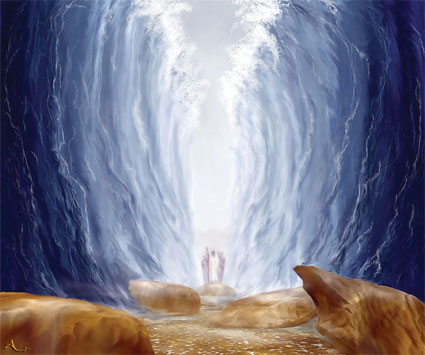
There was a discussion of purgatory on the BH list. Someone summarised it as follows: [1]
“Or, perhaps, with Peter Kreeft, one might interpret purgatorial cleansing as a form of heightened and perfected awareness, effected by the light of God’s presence as an illuminating and purifying fire. Thus, in death, in coming face-to-face with God, we finally see ourselves as we truly are, the depths of our own sin and brokenness, and all the consequences and ruin wrought by our own sin and unfaithfulness in our own lives, the lives of others, and the ongoing life of our family, church, and world.
Continue reading
Comments Off | tags: Atonement, Azal, Baptism, Communion, Crystal Sea, Laver, Purgatory, Roman Catholicism | posted in Biblical Theology, Quotes
Nov
18
2009
What was the Reformation?
———————————————————————————
“The unity of Rome is the unity of unbroken Adam and unbroken Saul.
It is a unity that will not go to the cross to be broken and resurrected.
It is a unity that would not confess when confronted by Nathan.”
———————————————————————————
 Have been having some debate with Bryan at “Called to Communion” blog on the nature of the church. Was the Reformation a rebellious schism or did the true church outgrow Rome? No guarantees on my scholarship but here’s some large excerpts that might be helpful or at least thought-provoking. Mike in roman type, Bryan in italic.
Have been having some debate with Bryan at “Called to Communion” blog on the nature of the church. Was the Reformation a rebellious schism or did the true church outgrow Rome? No guarantees on my scholarship but here’s some large excerpts that might be helpful or at least thought-provoking. Mike in roman type, Bryan in italic.
* * * * *
I agree with you that the Church that Christ founded is not “limited to any human institution”; we believe that it is a divine-human institution, because its founder is both divine and human. But its being a divine-human institution does not mean that it is a “merely human” institution, nor does it mean that it is not a human institution. To deny that it is a human institution is, in that respect, to deny Christ’s humanity. It is to assume (mistakenly) that the only kind of human institution there can be is a merely human institution. That’s like claiming that the only kind of human there can be is a mere human, not a divine human.
Before Jesus ascended, He gave the keys of the Kingdom to Peter. Christ still governs the Church, of course, but He does so through those whom He gave authority. That is why it is right for us to “Obey [our] leaders and submit to them, for they keep watch over [our] souls, as those who will give an account.” (Heb 13:17) That would not make any sense if only Christ governed His Church from heaven.
The church that Christ founded was not limited to any human institution as far as a centralised government goes. With the ascension of Christ, the government of worship by men moved from earth to heaven. It is now out of Satan’s reach and thus incorruptible. Local churches, as in Rev 2-3, are frequently assessed by Christ, and either nursed back to health, or, if consistently rebellious, he “snuffs” them out. Whether or not they remain as institutions, they are no longer part of the body – just as the cicada shell of Judaism is today.
* * * * *
Continue reading
Comments Off | tags: Reformation, Reformers, Roman Catholicism | posted in Biblical Theology, The Last Days
Sep
30
2009
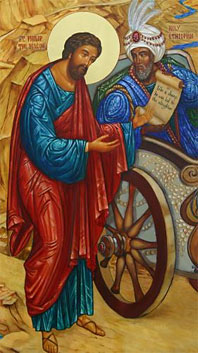
Roman Catholics like to remind us Protestants that the Reformation’s sola scriptura has caused unmitigated doctrinal division. Interpretation must be done in community by people who know what they are talking about.
In his talk this week (see previous post Heliocentric Preaching), Doug Wilson humourously described the “just me and my Bible” people who fail to realise that the Bible itself calls us to theology in community. We all need teachers, and the Bible is written the way it is so we are forced into some sort of discipleship. Left alone with our Bibles, we are all Ethiopian eunuchs.
So regarding sola scriptura and interpretive authority, I kind of agree with the Catholics! It has always been something done by the church community.[1]
H O W E V E R . . .
Continue reading
1 comment | tags: AD70, Atonement, Church History, Compromise, Doug Wilson, Ecclesiology, Reformation, Reformers, Roman Catholicism, Tim Nichols | posted in Against Hyperpreterism, Christian Life, The Last Days
Aug
3
2009
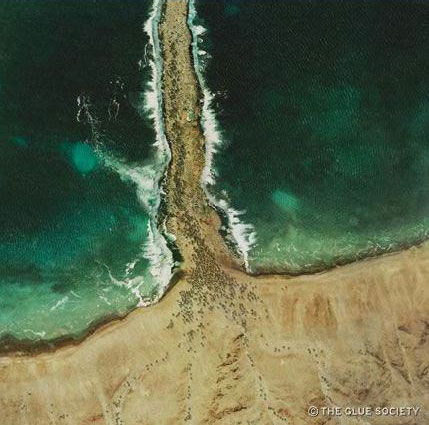
or Judaism is a Testimony to the End of the World
There is a patisserie in the Blue Mountains that bakes traditional German sourdoughs. Originally the mother culture for their sourdoughs was brought to Australia in a phial by the owner’s father from a bakery near Stutgart. The culture is 500 years old and has been given the name, “Corey”. This is a fantastic picture of what leaven symbolises in the Bible. It is not a symbol of sin. It is a symbol of historic continuity.
Continue reading
Comments Off | tags: Church History, Circumcision, Communion, Gary North, Passover, Pharaoh, Postmillennialism, Roman Catholicism | posted in Biblical Theology, Christian Life, Quotes, The Last Days
Apr
10
2009
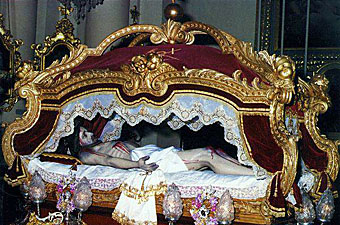
“Catholics do not worship idols, it would be a mortal sin if they did.”
Apparently there is a difference between veneration and worship? That is their argument.
I agree that the common argument against it is a bit weak, but James Jordan writes:
“This commandment is often misinterpreted as stating that no picture of God can be made. This is not what it says. What is says is that no image of anything can be set up as an avenue of worship to God and the court of heaven… Thus, the idea is not that of a “graven” image as opposed to a “molten” image or a “painted” image. The idea is that of a manmade graven object versus the God-made graven Word. The opposition is between God’s content-filled graven Words and man’s silentgraven images. The opposition of God’s verbal covenant and man’s graven images is set out in greater detail in Deuteronomy 4:15-31.”
Continue reading
Comments Off | tags: Church History, James Jordan, Roman Catholicism, Temple, Ten Commandments | posted in Biblical Theology, Ethics, The Restoration Era
Apr
10
2009
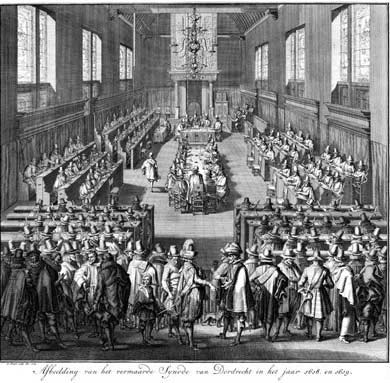 The Synod of Dort
The Synod of Dort
If you’ve ever been to a Synod, you’ll quickly find out that “truth” is determined by numbers.
So remarked a Catholic contributor on a Protestant forum recently. Is this a fair criticism of Protestant disunity? How should we Protestants reply? Thanks to James Jordan’s teaching, I think I can offer an answer.
Continue reading
Comments Off | tags: Church History, Communion, Mass, Priesthood, Protestantism, Roman Catholicism, Synod | posted in Biblical Theology
Apr
10
2009
Regarding churches claiming apostolic authority, particularly the Catholic/Protestant divide, something that is overlooked is that worship was centralised on earth but this ended in AD70. It was possible for Satan to roll the political power of Rome into bed with the religious authority of Judaism, and bring both systems down upon all true worship as persecution.
Since that time, the centre of true worship is in heaven. It is now impossible for Satan to corrupt or attack its centre because the new Jerusalem is above. We see this in Revelation 2-3. Not only is the menora now split into seven separate lampstands, the lampstands are in the holy place, seated with Christ.
So, when the Roman church became corrupt, God’s people came out. When protestantism becomes corrupt, God’s people come out. As Christianity declines in the west, it is booming in the southern hemisphere. Satan is bound from mounting an all-out worldwide attack on the church until he is released for a short time, and then only so he can be drawn out of Egypt like Pharaoh to be destroyed.
There is an institutional church, but in her visible form she is only ever local assemblies. The ‘city of God’ is in heaven, incorruptible, unassailable. If her earthly ‘branches’ leave the vine, they wither up. When they have only darkness to share, Jesus snuffs them out. They are no longer ‘the church’ regardless of whether the physical institutions remain.
Magisterially, the church governs from heaven. The new Jerusalem will descend at the end of history, but any attempt at a centralised, earthly city of God before then is doomed to failure, Roman Catholic or otherwise.
Comments Off | tags: AD70, Church History, Ecclesiology, Eschatology, Roman Catholicism | posted in Ethics































